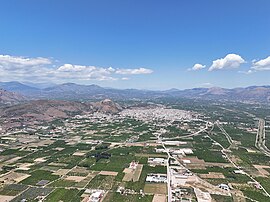Argos
Άργος | |
|---|---|
 Panoramic view of Argos | |
| Coordinates: 37°37′N 22°43′E / 37.617°N 22.717°E | |
| Country | Greece |
| Administrative region | Peloponnese |
| Regional unit | Argolis |
| Municipality | Argos-Mykines |
| Area | |
| • Municipal unit | 138.138 km2 (53.335 sq mi) |
| Elevation | 40 m (130 ft) |
| Population (2021)[1] | |
| • Municipal unit | 26,069 |
| • Municipal unit density | 190/km2 (490/sq mi) |
| • Community | 21,891 |
| Time zone | UTC+2 (EET) |
| • Summer (DST) | UTC+3 (EEST) |
| Postal code | 21200 |
| Area code(s) | 2751 |
| Vehicle registration | AP |
Argos (/ˈɑːrɡɒs, -ɡəs/; Greek: Άργος [ˈarɣos]; Ancient and Katharevousa: Ἄργος [árɡos]) is a city and former municipality in Argolis, Peloponnese, Greece and is one of the oldest continuously inhabited cities in the world, and one of the oldest in Europe.[2] It is the largest city in Argolis and a major center in the same prefecture, having nearly twice the population of the prefectural capital, Nafplio.
Since the 2011 local government reform it has been part of the municipality of Argos-Mykines, of which it is a municipal unit.[3] The municipal unit has an area of 138.138 km2.[4] It is 11 kilometres (7 miles) from Nafplion, which was its historic harbour. A settlement of great antiquity, Argos has been continuously inhabited as at least a substantial village for the past 7,000 years.[2]: 121-
A resident of the city of Argos is known as an Argive (/ˈɑːrɡaɪv/ AR-ghyve, /-dʒaɪv/ -jyve; ‹See Tfd›Greek: Ἀργεῖος). However, this term is also used to refer to those ancient Greeks generally who assaulted the city of Troy during the Trojan War; the term is more widely applied by the Homeric bards.
Numerous ancient monuments can be found in the city today. Agriculture is the mainstay of the local economy.
- ^ "Αποτελέσματα Απογραφής Πληθυσμού - Κατοικιών 2021, Μόνιμος Πληθυσμός κατά οικισμό" [Results of the 2021 Population - Housing Census, Permanent population by settlement] (in Greek). Hellenic Statistical Authority. 29 March 2024.
- ^ a b Bolender, Douglas J. (2010-09-17). Eventful Archaeologies: New Approaches to Social Transformation in the Archaeological Record. SUNY Press. ISBN 978-1-4384-3423-0. Retrieved 1 January 2011.
- ^ "ΦΕΚ B 1292/2010, Kallikratis reform municipalities" (in Greek). Government Gazette.
- ^ "Population & housing census 2001 (incl. area and average elevation)" (PDF) (in Greek). National Statistical Service of Greece. Archived from the original (PDF) on 2015-09-21.


